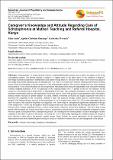| dc.contributor.author | Anab Edna, Agatha Christine Onyango, Catherine Mwenda | |
| dc.date.accessioned | 2022-01-27T12:47:19Z | |
| dc.date.available | 2022-01-27T12:47:19Z | |
| dc.date.issued | 2018 | |
| dc.identifier.issn | : 2330-426X | |
| dc.identifier.uri | https://repository.maseno.ac.ke/handle/123456789/4700 | |
| dc.description | http://www.sciencepublishinggroup.com/j/ajpn
doi: 10.11648/j.ajpn.20180601.13 | en_US |
| dc.description.abstract | Schizophrenia is a mental disorder which is a major public health concern since it affects the quality of life of the schizophrenic patient. The patient requires a caregiver to support them in the entire phase of the condition. Caregiver’s knowledge facilitate recognition of mental illness and health-seeking behavior. The aim of the study was to assess the caregiver knowledge and attitude regarding care of Schizophrenia. The study was conducted at Mathari Teaching and Referral Hospital, Kenya where the respondents were the caregivers of the schizophrenic patients. The research design used was cross-sectional mixed method. A total of three hundred and three respondents participated in the study, the respondents were selected by utilizing systemic sampling technique. A list was generated as the sampling frame every 3rd patient on the list was selected. All the caregivers of the patient had an equal chance of participating in the study. Data collection instruments used were an objectively structured questionnaire and key informant guide which were used to solicit both qualitative and quantitative data. Descriptive statistics mainly measure of central tendency was used. Pearson correlation coefficient and logistic regression were used to determine the magnitude of the correlation. Qualitative data were analyzed through content analysis, similar themes were grouped. The findings indicate majority of the respondents 191 (63%) were female while 218 (72%) of the respondents did not know the name of the condition the patient was diagnosed with. Knowledge on schizophrenia significantly depended on the age of the caregiver (Pr = 0.001) and the length of time the caregiver had taken care of the patient and knowing the patient (Pr = 0.001) (Pearson chi2). Further modelling of these variables using logistic regression showed that caregivers’ who have spent a long period with the patient are 3 times more likely to have a more positive attitude and be more knowledgeable compared to those who have spent a lesser period with a schizophrenic patient. The variable period with the patient is the most meaningful variable compared to the other variables in the model. Increasing the level of knowledge regarding the condition makes the caregiver more effective in their role as the patient’s support system. These findings are a good opportunity for the formulation of interventions based on the identified gaps resulting to caregiver’s full involvement in the care and management of the patient. | en_US |
| dc.publisher | American Journal of Psychiatry and Neuroscience | en_US |
| dc.subject | Attitude, Knowledge, Caregivers, Schizophrenia | en_US |
| dc.title | Caregiver’s Knowledge and Attitude Regarding Care of Schizophrenia at Mathari Teaching and Referral Hospital, Kenya | en_US |
| dc.type | Article | en_US |

